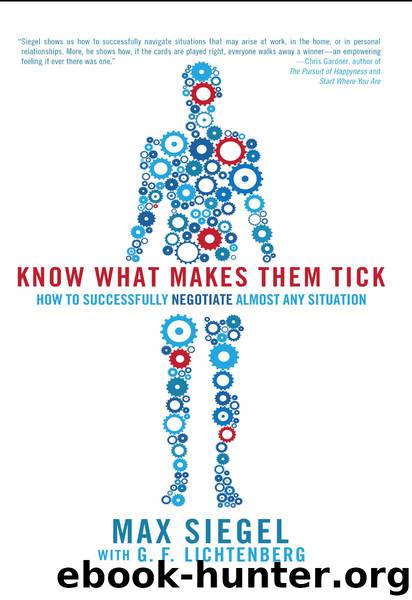Know What Makes Them Tick by Max Siegel

Author:Max Siegel
Language: eng
Format: epub
Publisher: HarperCollins
Published: 2010-04-14T16:00:00+00:00
I benefited from all three of these advantages when I became president of DEI and started to work on the company’s relationships with its corporate sponsors. As I discovered right away, there was one set way of doing things across the industry. Why were they set in their ways? NASCAR had enjoyed a tremendous amount of growth in commercial support over the years, which had been a great thing for the sport and for the fans, but exactly because they were used to success, there weren’t a lot of people thinking about new approaches. When I arrived, growth in the industry had leveled off, and it was time for some fresh ideas, but the requests for proposals that I was seeing were still all very similar.
The idea of how a sponsor could benefit from supporting a team was that the team would put the sponsor’s logo on the race car and then do their best to win or run at the front of the pack. That way people would see that logo on television and in publicity photos of the car. That’s a great model, but it was pretty much the only model at the time, which meant that every team was competing to give their sponsor the same thing: a winning car that would spend a lot of time up front, where the television cameras would see it.
But I wasn’t in the habit of working that way, and I wasn’t emotionally committed to doing things how they were “always” done. I felt freer to ask each sponsor or potential sponsor: What are your specific objectives? What kind of return would you most like to see on your investment in my company, and how could we help you get that? I didn’t feel so attached to the way things had been done before, so I could see it a little differently and I could feel comfortable trying something new.
Plus, when I started taking some new approaches, neither my company nor our sponsors could tune me out because they had heard it all from me before. They actually had to listen to me to find out who they were dealing with. And once we asked our new questions, we found that our different sponsors actually had very different goals. Sure, some wanted their logos seen on television to make their brands look bigger. But others wanted to increase foot traffic to their stores. The U.S. Army, which was a DEI sponsor, wanted to encourage people to consider the armed services as an alternative career. There was a wide range of goals.
For one sponsor, I said, “Forget putting logos on winning cars for a minute. Have you ever thought about the fact that we have a database of five million race fans, and that you might get more bang for your buck by marketing directly to our fan list? What if we sent text messages to fans with coupons they could bring to the store for team-themed products?” Now, if you come from an industry that already markets in this way, that idea was hardly rocket science.
Download
This site does not store any files on its server. We only index and link to content provided by other sites. Please contact the content providers to delete copyright contents if any and email us, we'll remove relevant links or contents immediately.
The Compound Effect by Darren Hardy(8908)
Tools of Titans by Timothy Ferriss(8347)
Nudge - Improving Decisions about Health, Wealth, and Happiness by Thaler Sunstein(7679)
Win Bigly by Scott Adams(7172)
Deep Work by Cal Newport(7042)
Rich Dad Poor Dad by Robert T. Kiyosaki(6578)
Principles: Life and Work by Ray Dalio(6388)
Pioneering Portfolio Management by David F. Swensen(6275)
Digital Minimalism by Cal Newport;(5740)
The Barefoot Investor by Scott Pape(5729)
Grit by Angela Duckworth(5577)
The Slight Edge by Jeff Olson(5399)
Discipline Equals Freedom by Jocko Willink(5357)
The Motivation Myth by Jeff Haden(5191)
You Are a Badass at Making Money by Jen Sincero(4906)
The Four Tendencies by Gretchen Rubin(4587)
Eat That Frog! by Brian Tracy(4500)
The Confidence Code by Katty Kay(4238)
Bullshit Jobs by David Graeber(4162)
